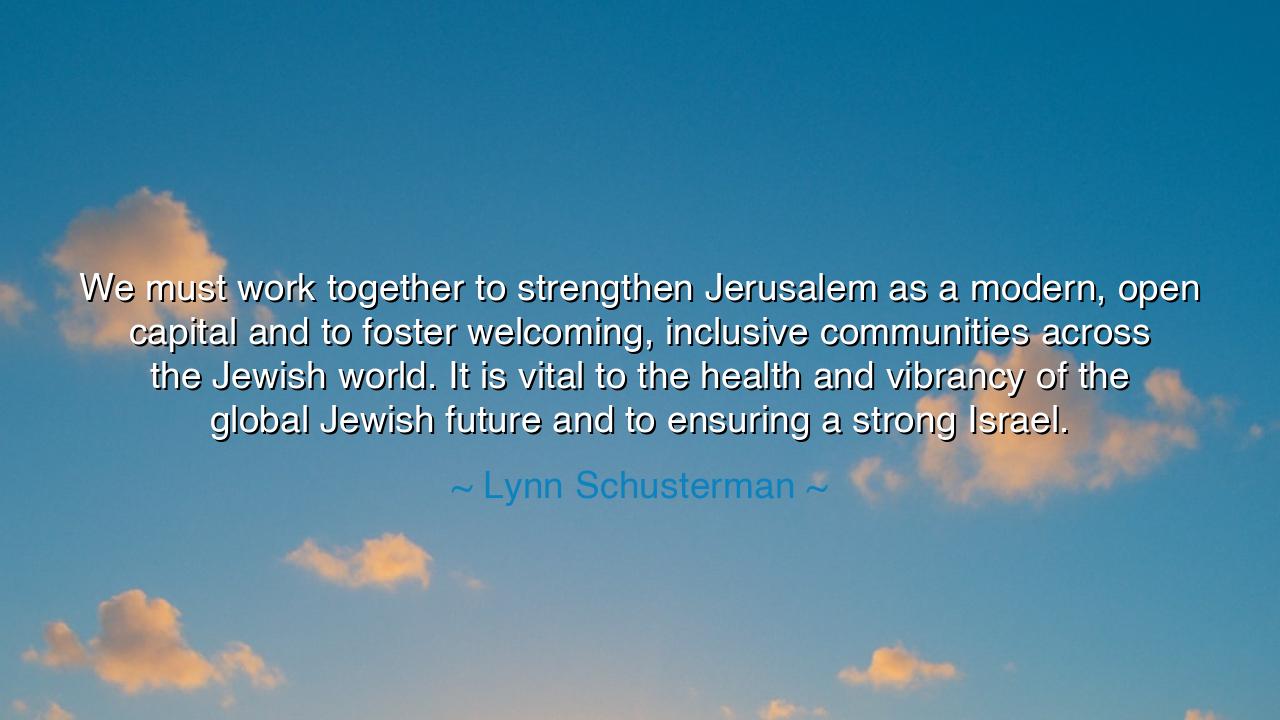
We must work together to strengthen Jerusalem as a modern, open
We must work together to strengthen Jerusalem as a modern, open capital and to foster welcoming, inclusive communities across the Jewish world. It is vital to the health and vibrancy of the global Jewish future and to ensuring a strong Israel.






“We must work together to strengthen Jerusalem as a modern, open capital and to foster welcoming, inclusive communities across the Jewish world. It is vital to the health and vibrancy of the global Jewish future and to ensuring a strong Israel.” These words, spoken by Lynn Schusterman, are not merely a call for policy or politics — they are a call for unity, renewal, and spiritual fortitude. In her vision, Jerusalem is not just a city of stone and prayer, but the living heart of a people — a beacon that must beat with both ancient strength and modern openness. Through this quote, she reminds us that a nation’s endurance depends not on walls or weapons alone, but on its ability to embrace diversity, compassion, and shared purpose.
In the ancient tongue, Jerusalem was called Yerushalayim, “the city of peace,” yet its story has often been written in struggle. For thousands of years, it has stood as a symbol of faith — revered, fought for, divided, rebuilt, and reborn. To “strengthen Jerusalem as a modern, open capital,” as Schusterman urges, is to renew this sacred mission: to make the city not only a place of memory but also of living harmony, where the past and present coexist, where heritage breathes within progress, and where holiness welcomes humanity. It is to honor the city’s divine purpose — to be a meeting place of souls, not a fortress of division.
The ancients knew that the health of a people is bound to the health of their community. When tribes quarreled and the bonds of kinship weakened, they fell prey to chaos. But when they worked together, their strength multiplied beyond measure. So too does Schusterman speak of the global Jewish community, scattered across nations yet bound by shared faith and destiny. She calls upon her people — and by extension, all peoples — to build bridges, to foster inclusivity and belonging, for the spirit of a nation thrives only when every voice is valued. Just as the body fails when one organ suffers, so too does humanity falter when one community is left behind.
History offers countless reminders of this truth. When the Jewish people were exiled after the destruction of the Second Temple, their survival did not depend solely on power or land, but on the unity of spirit. They built communities in foreign lands, creating networks of scholarship, charity, and mutual care. From Babylon to Spain, from Poland to America, their resilience flowed from their solidarity. Wherever they found themselves, they carried Jerusalem in their hearts — a symbol not only of homeland, but of hope. Schusterman’s words, spoken in the modern age, are thus a continuation of this ancient inheritance: that the strength of Israel and the Jewish people lies in their ability to come together — not in uniformity, but in shared purpose.
Consider, for instance, the vision of David Ben-Gurion, Israel’s first prime minister. In the nation’s earliest, most fragile days, he urged his people to build a country that was both rooted in tradition and open to the future. He understood, as Schusterman does, that survival alone was not enough — the goal must be vibrancy, the flourishing of culture, innovation, and compassion. His dream was not only of a strong state, but of a moral light among nations. The same spirit now lives in Schusterman’s call: to strengthen Jerusalem not only in might, but in openness — to make it a home where ancient faith and modern thought walk hand in hand.
Yet this call reaches beyond Jerusalem. It is a mirror for all of us, in every land and faith. To “foster welcoming, inclusive communities” is to follow one of the oldest commandments known to humankind: to love the stranger, to protect the vulnerable, and to seek unity without erasing difference. Whether in Jerusalem, or in the towns and cities of the world, this teaching holds true — that peace is not built by walls, but by understanding; not by exclusion, but by empathy.
Therefore, my children, let this be the lesson of Lynn Schusterman’s wisdom: a community thrives when its heart remains open, its heritage honored, and its people bound together in shared purpose. If Jerusalem is to be strong, it must be both a guardian of the past and a gateway to the future. And if the Jewish people — indeed, all people — are to endure, they must remember that strength without compassion is brittle, and faith without inclusivity is hollow. Work, then, for the unity of your communities. Speak with kindness, listen with respect, and build with courage. For in the harmony of many voices lies the eternal health of the human spirit — and in the strength of that harmony, Jerusalem shall always stand.






AAdministratorAdministrator
Welcome, honored guests. Please leave a comment, we will respond soon